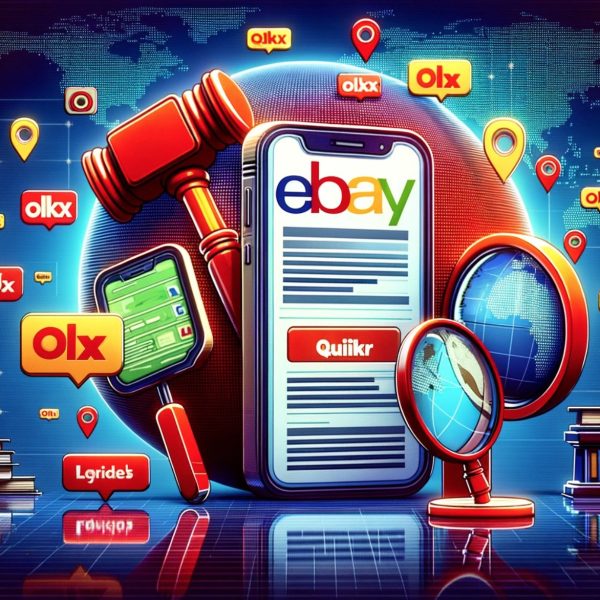Quikr vs OLX vs eBAY
April 13, 2024
Industry: Ecommerce

Quikr, OLX, and eBay each have unique strengths that cater to specific market needs. Quikr’s diversified and localized approach makes it a versatile player in urban India. OLX’s streamlined classifieds experience appeals to those seeking straightforward buy-sell interactions, especially in the automotive and real estate sectors. eBay offers a structured e-commerce experience with a focus on new and unique products, appealing to a different buyer segment. Understanding these distinctions is crucial for users, investors, and the companies themselves as they navigate the competitive e-commerce landscape in India.
When comparing Quikr, OLX, and eBay, it’s important to consider their distinct business models, market positioning, and operational strategies in the Indian online marketplace landscape. Each platform has carved out its niche, appealing to different segments of consumers and sellers with varying needs and preferences. Here’s a detailed analysis that examines each platform across several dimensions:
1. Business Models and Core Offerings
- Quikr: Started as a classifieds platform, Quikr has evolved to offer a broader range of services, including real estate transactions, jobs, services, and a community marketplace. It is known for its hyperlocal approach, catering to a wide spectrum of categories from second-hand goods to services like education and beauty treatments.
- OLX: Similar to Quikr, OLX operates primarily as a classified ads platform. It focuses on facilitating direct interactions between buyers and sellers without intervening in the transactions. OLX is part of a global network, which gives it an edge in experience and technological leverage. The platform is especially strong in the automotive and real estate sectors.
- eBay: Unlike Quikr and OLX, eBay functions more like a traditional online marketplace, providing a transactional platform where it often intermediates payments and logistics. It serves both business-to-consumer (B2C) and consumer-to-consumer (C2C) segments, with a significant emphasis on new and used goods. eBay’s model includes auction-style listings, which are distinctive compared to the standard classified listings of Quikr and OLX.
2. Market Penetration and User Engagement
- Quikr: It has a strong presence in urban and semi-urban areas of India, leveraging its diverse service offerings to penetrate deeper into these markets. Quikr’s strategy of offering additional features like Quikr Doorstep (for delivery) enhances user convenience, which is crucial for retaining users in a competitive market.
- OLX: With a strong brand recall, OLX commands substantial traffic and has high visibility across India. Its simplicity and effectiveness in facilitating buyer-seller communications have made it a preferred platform for used goods, particularly cars and bikes.
- eBay: eBay’s global presence brings a level of trust and a diverse product range, attracting a niche segment of buyers interested in both Indian and international products. However, eBay’s market penetration in India is relatively less aggressive compared to OLX and Quikr, focusing more on specific categories like collectibles, electronics, and fashion.
3. Technological Innovation and User Experience
- Quikr: Innovates primarily in service diversification and local reach. Its mobile app and website are user-friendly, although the breadth of services can sometimes lead to a cluttered user experience.
- OLX: Invests heavily in mobile technology and AI to enhance user interactions and safety. Its interface is generally clean and easy to navigate, focusing on user postings and quick searches.
- eBay: Known for a robust e-commerce infrastructure, eBay offers detailed product descriptions, a secure payment gateway, and a comprehensive customer protection program. Its technology is geared towards a seamless shopping experience, with a significant focus on transaction security and user authentication.
4. Valuation
As of 2024, the valuation of companies like Quikr, OLX, and eBay can vary widely based on their market performance, recent funding rounds, and strategic developments. Here’s a closer look at each company’s valuation and the factors influencing these numbers:
Quikr
Quikr, primarily active in the Indian market, has seen several funding rounds and strategic shifts that impact its valuation. The last widely reported valuation was around $1.5 billion during its later funding rounds before 2020. However, without public access to its recent financials or funding details, providing an updated valuation is challenging. Quikr’s valuation would depend significantly on its revenue growth, profitability, market expansion, and the success of its diversification strategies in various service segments.
OLX
OLX is part of the OLX Group, which operates globally and is owned by Prosus, one of the largest technology investors in the world. The valuation of OLX isn’t publicly disclosed as a separate entity because it’s part of a larger conglomerate that operates multiple tech platforms worldwide. However, the overall valuation of Prosus’s classifieds business, which includes OLX among other platforms, was estimated to be several billion dollars, reflecting the group’s extensive reach and market penetration across various countries.
eBay
eBay is a publicly traded company on the NASDAQ, making its valuation more transparent and subject to market conditions. As of April 2024, eBay’s market capitalization is approximately $30 billion. This valuation reflects its global operations, steady revenue from online retail and marketplace services, and its adaptability in various international markets. eBay’s valuation is influenced by its financial performance, competitive positioning, e-commerce trends, and global economic factors.
5. Investors
Let’s delve into the investors and founders associated with Quikr, OLX, and eBay, which reflect their origins, backing, and strategic direction.
Quikr
Founders: Quikr was founded by Pranay Chulet and Jiby Thomas in 2008. Pranay Chulet, an alumnus of IIT Delhi and IIM Calcutta, has been the driving force behind Quikr’s evolution from a simple classifieds platform to a more diversified marketplace.
Investors: Quikr has been supported by a range of investors from venture capital firms to private equity. Key investors include Warburg Pincus, Norwest Venture Partners, eBay Inc., Matrix Partners India, and Steadview Capital. These investors have contributed to Quikr’s growth and expansion strategies through multiple funding rounds, reflecting strong confidence in its business model and market potential.
OLX
Founders: OLX was founded by Fabrice Grinda and Alec Oxenford in 2006. Fabrice Grinda is known for his expertise in building marketplace businesses, while Alec Oxenford has experience in technology and entrepreneurship, particularly in the classifieds sector.
Investors: OLX is a part of the OLX Group, which itself is owned by Prosus (formerly known as Naspers). Prosus is a global consumer internet group and one of the largest technology investors in the world. Initially, OLX also received backing from various investors like Nexus Venture Partners and Bessemer Venture Partners, but its major strategic direction has been shaped by its parent group, Prosus.
eBay
Founders: eBay was founded by Pierre Omidyar in 1995. Starting as a pioneering online auction site, Pierre Omidyar’s vision was to create a vibrant online marketplace for buying and selling a wide variety of goods and services.
Investors: eBay was initially a privately held company but went public in 1998. Since its IPO, eBay has been publicly traded and is now owned by a broad array of institutional and retail investors. As a public company, its investor base is continually evolving, driven by market transactions rather than specific venture capital or private equity investments.
6. Competitive Edge and Future Outlook
- Quikr: Needs to continue innovating in localized service offerings and improving trust and safety measures. Expansion into less penetrated markets could be a key growth driver.
- OLX: Should maintain its simplicity and enhance safety features to remain competitive. Increasing service categories and improving technological features for better user profiling could benefit OLX.
- eBay: While it continues to be a global player, eBay might need to tailor its strategies to better cater to Indian consumers’ preferences, possibly expanding its logistics support and localizing product offerings.








